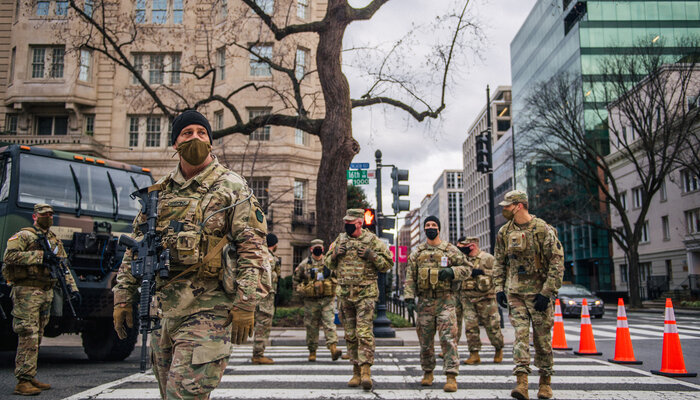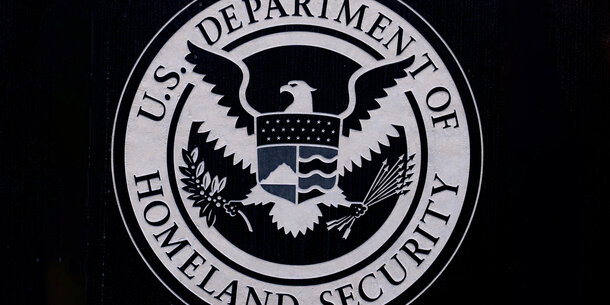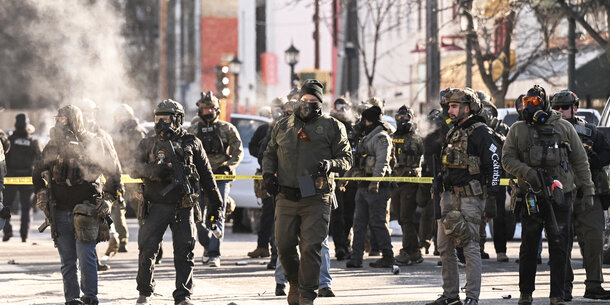The January 6 committee hearings have painted a vivid picture of how our democracy came under attack. One particularly chilling revelation was that white supremacist groups like the Oath Keepers and Proud Boys were “standing by” — as Donald Trump requested months before — awaiting Trump’s orders to take up arms. They stayed glued to Trump’s Twitter feed as they stormed the Capitol building, believing that an invocation of the Insurrection Act would authorize them to serve as his personal army.
Outlandish as that might seem, it’s not clear they were wrong. And that’s only one of the reasons why Congress should reform this outdated and dangerous law. On Tuesday, the Brennan Center submitted a statement to the committee setting forth a proposal for doing just that.
The Insurrection Act — an amalgamation of laws passed between 1792 and 1874 — is arguably the most significant of the president’s statutory emergency powers. It authorizes the president to deploy the U.S. armed forces domestically and use them to quell civil unrest or enforce the law in a crisis. In this way, it operates as an exception to the Posse Comitatus Act, the law that generally bars federal military personnel from participating in civilian law enforcement.
The use of the military as a domestic police force represents a sharp departure from core constitutional values. The framers understood that military interference in civilian affairs threatens democracy and individual liberty, and they were careful to subordinate the military to civilian authorities. But they also recognized that a true crisis might necessitate military intervention. They left it to Congress to strike a judicious balance between these competing considerations.
The Insurrection Act fails utterly in this task. Its text is vague and overbroad, granting the president almost limitless discretion to use troops for domestic law enforcement. For instance, one of its provisions permits deployment to suppress any “unlawful combination” or “conspiracy” that “opposes or obstructs the execution of the laws of the United States.” Taken literally, this would allow the president to deploy the 82nd Airborne in response to two people conspiring to intimidate a witness in a federal trial. A more realistic (and worrisome) abuse scenario would involve the use of troops to suppress an unpermitted but peaceful protest against a controversial executive order, such as Trump’s Muslim ban.
In such cases, the Insurrection Act allows the president to respond “by using the militia or the armed forces, or both, or by any other means” (emphasis added). This alarming delegation of unlimited power explains why the Oath Keepers and similar groups hung their hopes on this law. Congress has defined “militia” to include “all able-bodied males at least 17 years of age and . . . under 45 years of age who are, or who have made a declaration of intention to become, citizens of the United States and of female citizens of the United States who are members of the National Guard.” A substantial portion of white supremacist organizations’ members would likely meet that definition, and in theory, the others could be mobilized under the “any other means” language.
Despite this extraordinary delegation of power, the Insurrection Act in its current form contains virtually no checks against abuse. Previous versions of the law required advance judicial sign-off and placed time limits on the use of troops to enforce the law absent congressional approval. But Congress removed those provisions, leaving no role for the other branches of government. The Supreme Court has held that the law gives the president complete discretion to decide whether deployment is warranted.
Such a broad and unrestricted delegation of authority was dangerous at any time in our nation’s history. In the modern era, it is also entirely unjustified. Most of the law’s provisions were designed for the Civil War and the terrorist insurgency that followed in the former Confederacy. These threats were extinguished long ago, yet the powers crafted to address them have lingered, virtually unchanged, for 150 years. Furthermore, when the law was written, police departments were still in their infancy and federal law enforcement was all but nonexistent. Many situations that might have required assistance from the military in the 18th and 19th centuries would be well within the capacity of today’s law enforcement to handle. In short, nothing about the Insurrection Act is tailored to the needs of the United States in 2022.
That is not to say that military intervention in domestic crises is never appropriate. In the late 1950s and early 1960s, for instance, Presidents Dwight D. Eisenhower and John F. Kennedy both invoked the Insurrection Act to enforce federal court orders desegregating schools in the South. Other presidents, however, have used the law to break strikes and subdue labor movements. And in the weeks leading up to January 6, Trump’s allies urged him to invoke the Insurrection Act as part of a strategy to overturn the election results. Indeed, it would have been frighteningly easy for Trump to invoke the law on January 6 to shut down Congress, thus delaying or preventing certification of the vote on the pretext of keeping the peace.
The potential for abuse is clear. What’s needed is legislative reform that meaningfully guards against such abuse while preserving the ability to deploy troops in a true crisis — including a possible future insurrection against a sitting president, in which the president genuinely seeks to preserve democracy. The Brennan Center’s proposal, developed in consultation with numerous experts and several allied organizations, would accomplish this end.
First, the proposal more specifically and narrowly defines both the criteria for deployment and what the president may do in response. For instance, while an insurrection against federal or state government would always warrant deployment, obstruction of federal law would trigger deployment authority only if it deprived a group or class of people of their constitutional rights — explicitly including the right to vote — or if it created an immediate threat to public safety that could not be handled by state or federal law enforcement. In responding to such crises, the president could deploy active-duty armed services or call the National Guard into federal service, but he could not deputize private citizens to act as soldiers. Moreover, the proposal would clarify that the Insurrection Act does not authorize the suspension of habeas corpus — holding people without trial — or the complete displacement of civilian authority, also known as “martial law.”
To ensure adherence to these limitations, the proposal includes mechanisms for congressional and judicial oversight. At the time of deployment, the president, secretary of defense, and attorney general would be required to submit a joint certification and report to Congress setting forth certain basic information. The authority provided by the law would expire automatically after seven days unless approved by Congress using expedited procedures that would prohibit filibustering and allow any member to force a vote. Finally, courts would be authorized to review whether the criteria for deployment were met — employing a deferential “substantial evidence” standard of review to ensure that courts did not simply replace the president’s judgment with their own.
These reforms are critical to safeguarding our democracy. They would ensure that a president who needed to deploy federal troops to suppress an insurrection would have ample authority to do so, while a would-be autocrat who wished to carry out an insurrection would not be able to exploit the law for that purpose. If the January 6 committee plans to issue policy recommendations, reforming the Insurrection Act along the lines of the Brennan Center’s proposal should be among them.




